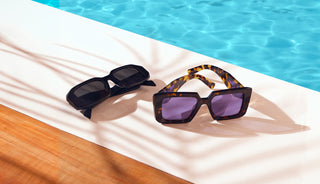Summer is well underway, and the days are filled with bright sunlight. You want to get a new pair of sunglasses to avoid squinting your eyes. However, with so many options of shapes, colours, styles, and protections available, choosing the right pair of sunglasses can be a bit overwhelming.
Since this is an item you're likely to wear practically every day of the summer season, you need to choose the pair that will offer you optimum comfort and a style to match.
Read on to find out how to choose your next pair of sunglasses. You'll have a good overview!
WHAT TO CONSIDER BEFORE CHOOSING A PAIR OF SUNGLASSES
- UV protection
- Lens features of the sunglasses
- Lens colour of the sunglasses
- Frame colour
- Frame size and shape
- Frame material
- Sunglasses style
- Prescription lenses
- Lifestyle
1. UV protection
When choosing sunglasses, protection against harmful UV rays is essential. Make sure to select sunglasses that offer 100% UV protection to keep your eyes completely shielded from the sun's harmful effects.
2. Lens features of the sunglasses
There are several types of sunglass lenses, each with distinct clarity, weight, durability, and cost. Lenses are available in various materials, each with its own characteristics. Here are some common ones:
Polycarbonate lenses
Polycarbonate lenses are lightweight, impact-resistant, and offer good optical clarity. They are ideal for active individuals or outdoor activities.
Plastic lenses
Plastic lenses are affordable and lightweight, but they may be less durable than other options. They are generally suitable for occasional use.
Glass lenses
Glass lenses provide excellent optical clarity and scratch resistance. However, they may be heavier than other materials.
Polarized lenses
Polarized lenses reduce annoying glare and improve contrast perception. They are perfect for outdoor activities, especially on water or snow.
Photochromic lenses
Photochromic lenses automatically adapt to ambient lighting, darkening outdoors and lightening indoors. They offer versatility for different lighting conditions.
Mirrored lenses
Mirrored lenses have a reflective coating on the outside that reduces the amount of light reaching your eyes. They are both stylish and offer additional glare protection.
3. Lens colour of the sunglasses
Choose your lens colour! There is a variety of lens colours that play a significant role in colour perception and style. Here are some common options:
- Gray lenses reduce brightness while preserving natural colours.
- Brown lenses enhance contrasts and are well-suited for outdoor activities.
- Green lenses offer excellent clarity and reduce excessive brightness.
- Yellow lenses increase brightness in low-light conditions and improve contrast on cloudy days.
4. Frame colour
It's recommended to choose a frame colour that complements your skin tone. Warm tones like gold or brown generally suit warm complexions, while cooler tones like black or silver suit cooler complexions.
5. Frame size and shape
The frame size and shape should match your face size and shape for an optimal fit. Here are some popular frame shapes:
Aviator
Aviator-style sunglasses feature a pilot shape with large lenses and a thin frame. They suit different face types and offer a classic look.
Square
Square-shaped sunglasses have distinct angles and a bold appearance. They generally suit round or oval faces.
Oval
Oval-shaped sunglasses have soft lines and fit well with most face shapes. They are versatile and timeless.
Cat-Eye
Cat-eye style sunglasses have uplifted outer corners that give a retro and feminine look. They suit angular or square faces.
There are other frame shapes, like round, rectangular, or hexagonal, which may suit specific styles and personal preferences.
6. Frame material
Sunglasses frames are made from different materials, each with its own characteristics in terms of durability, comfort, and style. Common options include plastic, acetate, metal, and titanium.
Plastic:
Lightweight and affordable, plastic is perfect for occasional use or for those looking for a trendy look on a budget. Shop plastic sunglasses
Metal:
Finesse and elegance characterize metal frames, often chosen for their lightness and minimalist look. Recommended for professional use or sleek styling. Explore metal models
Titanium:
Ultra-light, hypoallergenic and extremely resistant, titanium is the top-of-the-range choice for those seeking both performance and longevity. See our titanium eyewear
7. Sunglasses style
There are also various sunglass styles. Choose one that suits your lifestyle, tastes, and individual needs. Here are some examples:
Classic sunglasses
Classic frames are timeless and versatile, suitable for different styles and occasions.

Modern sunglasses
Modern frames stand out with contemporary aesthetics and elegant details, perfect for those seeking a trendy look.

Retro sunglasses
Retro frames offer a vintage charm and are ideal for those who appreciate retro style or want to add a nostalgic touch to their look.

8. Prescription lenses in sunglasses
If you need vision correction, you can have your prescription adapted to the lenses of your sunglasses. Consult an optometrist during an eye exam at New Look to get a valid prescription and obtain sunglasses lenses with your correction.
9. Lifestyle
Choosing the right pair of sunglasses doesn't just depend on style or design - your lifestyle and daily activities play an essential role. A frame adapted to your pace will offer you greater comfort, performance and durability. Take the time to think about when and how you wear your glasses: this will help you make a choice that combines style, comfort and functionality.
10. Seek advice from our New Look professionals
With all this detailed information, you are now able to find the perfect pair of sunglasses! If you need additional advice, our professionals at New Look are here to help. Whether in person at our stores or online through virtual consultations, our teams are available!






